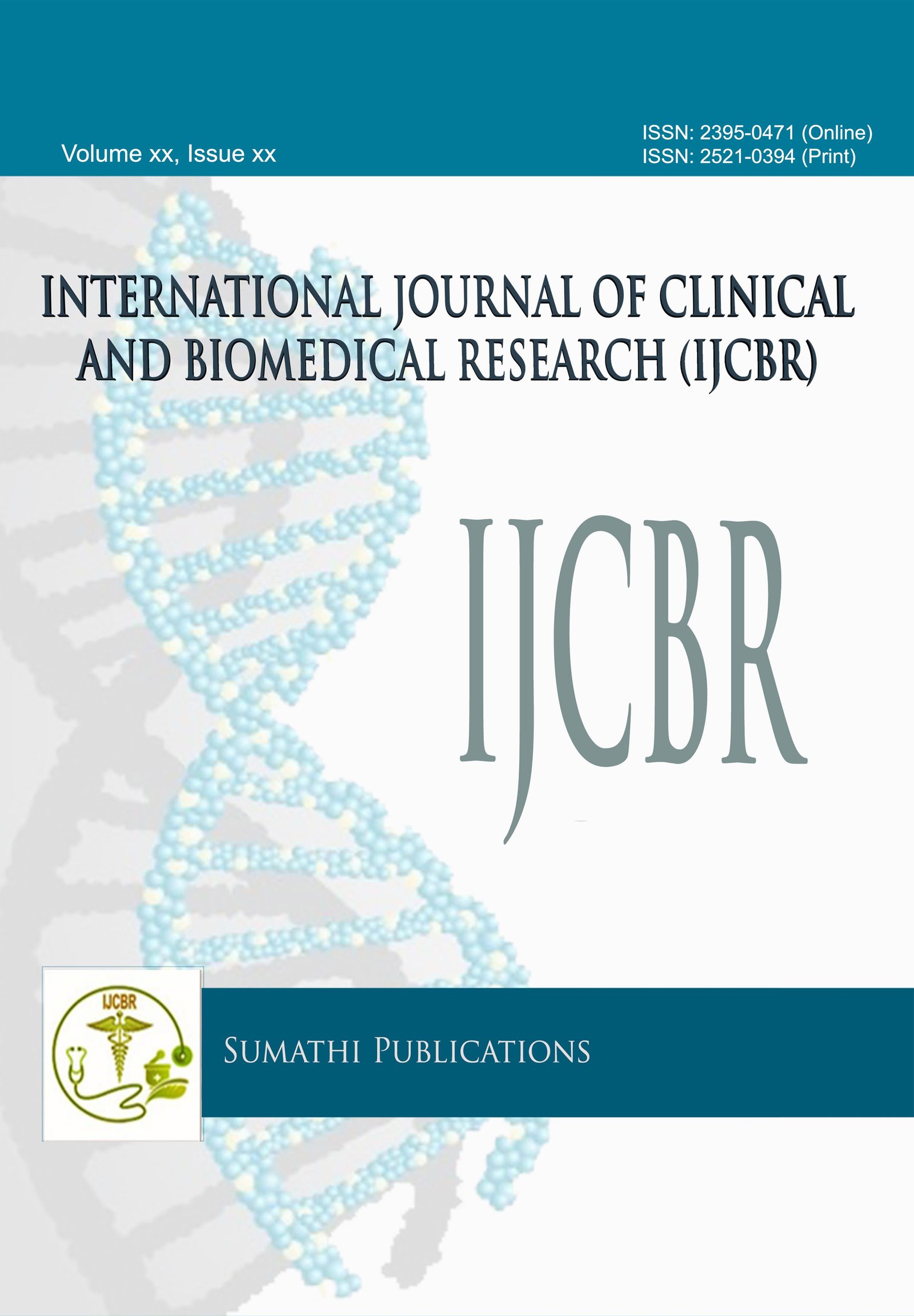CLINICAL OUTCOME OF CHEWING GUM ON BOWEL MOTILITY AMONG PATIENTS UNDERGOING ABDOMINAL SURGERY
DOI:
https://doi.org/10.5455/ijcbr.2017.34.21Abstract
Introduction: Postoperative paralytic ileus is one of the commonest causes of morbidity in abdominal surgeries. The aim of the present study was to evaluate efficacy of chewing gum in on bowel motility among patients who have undergone abdominal surgery. Methods: The details of patients along with diagnosis, co-morbidities, duration of anesthesia & surgery and post-operative stay were recorded. Patients that received chewing gum in addition to standard postoperative care were grouped as cases while those that received standard postoperative care were grouped as controls. The patients were observed for Peristaltic Sounds, Flatus passed, Stool Passed, return of appetite and time was recorded. Results: The study was conducted with 200 patients of which 100 each were grouped as cases and controls. Majority of the patients in Cases Group were in the age group of 40-50 years (42%). The mean age of the patients was 47.3 ±12.97 years. 7 (23.3%) patients in Cases Group had hypertension while 5 (16.7%) patients had diabetes mellitus. 8 (26.8%) patients in Control Group had hypertension while 4 (13.4%) patients had diabetes mellitus. 47 (47%) patients in Cases Group had enterocolon diseases while 43 (43%) and 10 (10%) patients had hepatobiliary and pancreatic diseases respectively. 46 (46%) patients in Control Group had enterocolon diseases while 45 (45%) and 9 (9%) patients had hepatobiliary and pancreatic diseases respectively. There was no statistical significance on comparison between the groups with respect to age, sex, co-morbidities and diagnosis. The mean duration of induction of anesthesia was 27.08±0.89 minutes and 28.16±1.14 minutes in Cases and Control Group respectively. The mean duration of surgery was 2.67±0.21 hours and 2.44±0.19 hours in Cases and Control Group respectively. The mean duration of return of Bowel Sound was significantly lesser in Cases Group as compared to Control Group (9.9±1.37 vs. 36.1±6.72 hours). The mean duration of first passage of flatus was significantly lesser in Cases Group as compared to Control Group (14.8±2.13 vs. 81.1±5.47 hours). The mean duration of time to first faeces was significantly lesser in Cases Group as compared to Control Group (36.1±7.28 vs. 107.6±6.87 hours). The mean duration of return of appetite was significantly lesser in Cases Group as compared to Control Group (19.3±2.13 vs. 87.6±5.47 hours). The duration of post-operative hospital stay was significantly lesser in Cases Group as compared to Control Group (72.1±7.28 vs. 155.6±6.87 hours). Conclusion: Gum chewing in patients undergoing abdominal surgery can be an effective intervention to facilitate the passage of flatus and feces, shorten the time to dietary intake, and shorten the length of hospital stay by promoting bowel motility.
Key words: Abdominal surgery, Bowel motility, Chewing gum.
Downloads
Downloads
Published
Issue
Section
License
The journal allows the author(s) to hold the copyright without restrictions and will retain publishing rights without restrictions.
The submitted papers are assumed to contain no proprietary material unprotected by patent or patent application; responsibility for technical content and for protection of proprietary material rests solely with the author(s) and their organizations and is not the responsibility of the journal. The main (first/corresponding) author is responsible for ensuring that the article has been seen and approved by all the other authors. It is the responsibility of the author to obtain all necessary copyright release permissions for the use of any copyrighted materials in the manuscript prior to the submission.
What are my rights as an author?
It is important to check the policy for the journal to which you are submitting or publishing to establish your rights as
Author. Journal's standard policies allow the following re-use rights:
- The journal allows the author(s) to hold the copyright without restrictions.
- The journal allows the author(s) to obtain publishing rights without restrictions.
- You may do whatever you wish with the version of the article you submitted to the journal.
- Once the article has been accepted for publication, you may post the accepted version of the article on your own personal website, your department's website or the repository of your institution without any restrictions.
- You may not post the accepted version of the article in any repository other than those listed above (i.e. you may not deposit in the repository of another institution or a subject-matter repository) until 12 months after publication of the article in the journal.
- You may use the published article for your own teaching needs or to supply on an individual basis to research colleagues, provided that such supply is not for commercial purposes.









